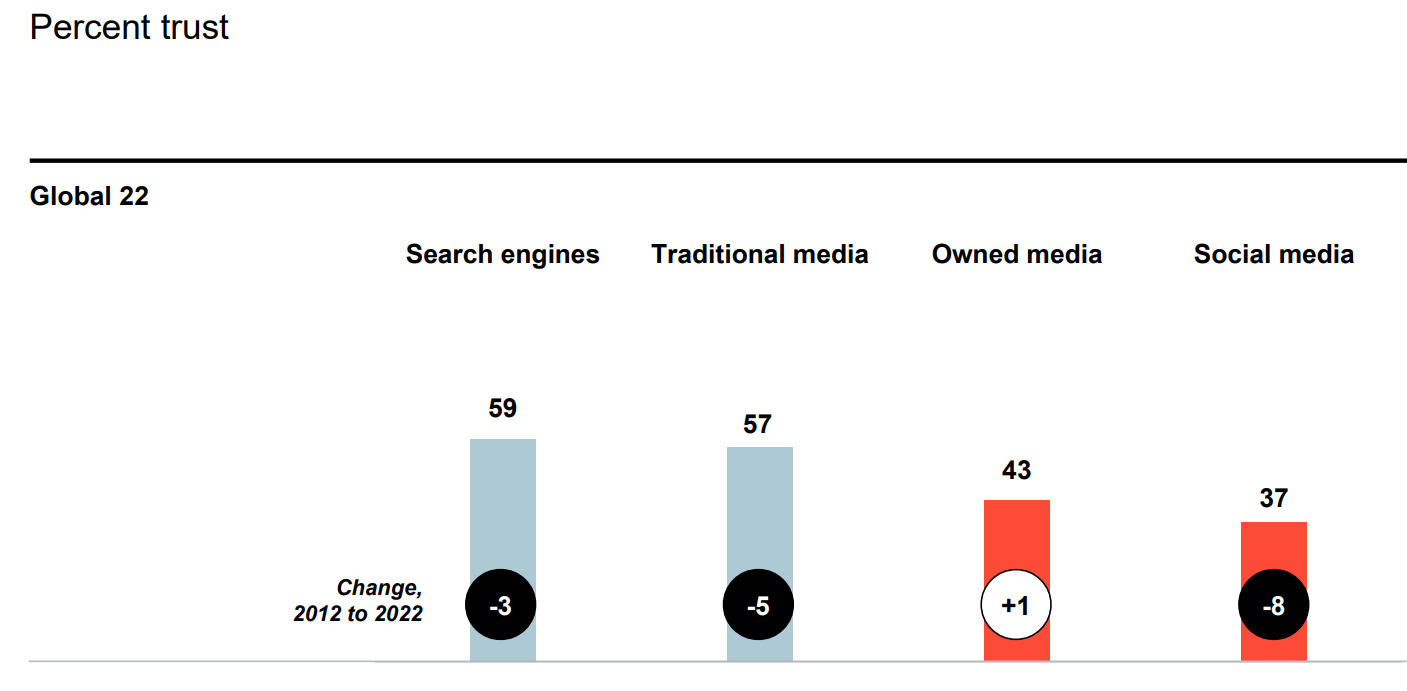Content Marketing for Small Business: Why Direct Your Focus on Creating Great Content
June 22, 2022

SINGAPORE – Know how you can take advantage of quality content in converting leads to loyal customers.
With traditional ads losing traction and consumers spending more time online, digital marketing is a tool that businesses must already know how to use. For years, it has given many small businesses a headstart against their competitors and even enabled them to catch up with bigger companies in terms of leads and conversions.
Content marketing, in particular, has allowed small businesses to closely interact with their target market and helped them build trust, authority, and credibility among their networks of clients and partners — some of the key indicators of a successful business.
In this article, discover why content marketing for small business is vital and how investing in the right content could just be the most important decision you can make for your company.
What is Content Marketing?
Perhaps the first thing that comes to your mind when you hear about content marketing are articles, videos, and social media posts. But there is actually more to it than just consumable media.
According to the Content Marketing Institute, content marketing is a strategic form of marketing that aims to create and distribute valuable, relevant, and consistent content with the goal of attracting a clearly defined target audience — and, ultimately, convince them to make a profitable customer action.
From this definition, it is clear that content marketing is not a direct marketing approach wherein a business simply publishes promotional images and write-ups without a specific audience in mind. Rather, it is a strategy where a business focuses more on providing its existing clients or target groups with engaging customer experiences which genuinely address their problems and needs, leading them to form a relationship built on trust, and eventually cultivating real interest in the business’ services and products.
What is the Purpose of Content Marketing for Small Businesses?
Just like any other business, your ultimate goal is to generate sales. But this would not be possible without having a loyal customer base.
To build a customer base, you must be able to prove to your leads why your products and services are worth their money and continue to actively engage with them after their purchase for effective audience retention. While you can demonstrate your value with traditional or paid advertising, it does not do much in preserving the interest of customers to your brand, and may result in you paying for even more ads down the line.
Here’s where content marketing comes in. Content marketing keeps your customers and prospects organically engaged with your original content as it gives them something valuable — whether it be a solution, new knowledge, advice, or entertainment — driving them to trust your brand and boost your sales.
Although this strategy may sound idealistic, it actually works. Data from Demand Metric shows that per dollar spent, content marketing drives approximately three times as many leads as traditional marketing and even costs 62% less to implement. Moreover, OptinMonster reported that 72% of marketers believe content marketing increases engagement — another indicator of content marketing return on investment (ROI). With these favourable statistics and the numerous forms of content creation tools you can use, you have your secret to establishing authority and trust within your industry.
Your Edge Over Bigger Competitors When It Comes to Content Marketing
Despite these figures, it can still feel intimidating once a bigger company enters your market, especially when you realise they have access to more advanced marketing tools. However, as a small business, content marketing offers you advantages that large companies can never compete with once you learn how to leverage them:
Content Marketing Projects Your Business as a Fresh Name in the Market — Even When You Rebrand
As a small business, nothing much is known about you yet. This means you can always start with a clean slate with the help of a great content strategy if you wish to rebrand.
Larger enterprises, on the other hand, may have the upper hand when it comes to brand awareness but they have more to lose in terms of following and resources if they are eyeing to do the same.
Content Marketing Makes It Easier For You to Build Personal Connections
Most large businesses tend to have a hard time attending to all the enquiries they get from their content because of the volume of messages they receive daily and end up resorting to automated messaging features such as chatbots and auto-email replies. Although a representative can reply to these messages at a later time, not getting a genuine reply upfront can be a turn-off for some customers.
Nothing beats human interaction. Even if a bigger company also uses content marketing to build brand awareness, your advantage is how quickly and genuinely you can respond to a message once a lead engages with your content.
Additionally, large companies often sound more “professional” than “conversational” which can be perceived as cold and impersonal, whereas small businesses can easily inject their personality into their content, making customers feel like they are speaking to a friend rather than a corporation.
Content Marketing Allows You to Receive High Returns at a Low Cost
Big companies often dedicate a large cost towards their marketing efforts, so if sudden changes to marketing conditions occur, they could suffer a great loss on their part.
Let’s use the following data for example.

Email marketing ranks 3rd as the top marketing channel companies leverage on at 35%, followed closely by content marketing at 32%. (Source: HubSpot)
According to HubSpot, 35% of marketers maximise the use of email marketing to gain brand awareness, traffic, and conversions. This is most likely because of its high ROI compared to other marketing channels that companies have reported over the past year. However, according to the previously mentioned infographic from DemandMetric, a whopping 91% of email users unsubscribe from company emails.
Hence, if a company has largely invested in an email automation platform but it does not generate a high ROI as expected, it is a huge waste of money and effort on their part even if they also invest in other marketing channels.
Small businesses, on the other hand, can generate great returns on minimal investment and can easily switch between different forms of content marketing. In fact, there are a few free tools that small businesses can take advantage of, which we will later expound on in this article.
How to Create an Effective Content Strategy for Your Small Business
Now, it’s not enough to just post random content whenever you like. You need to come up with an elaborate strategy that will naturally draw your audience to your brand. Here are some of the elements and qualities your content strategy must possess:
Great Quality Content
Your content marketing efforts would mean nothing if it does not provide what your prospective customer is specifically looking for. See to it that your content always provides value to those who intend to consume it. For example, you wouldn’t have continued to read this article if you didn’t think it would help your business, would you? Keep your content meaningful for your end-users to retain their loyalty.
Consistency
No business has ever gone from zero to hero in content marketing with just one piece of content. You have to set a regular schedule when you release your content based on your customers’ activity in your chosen platform. It is also important to consider what form of content is best to release at certain times and days. Manage and keep track of your schedule with a content calendar.
Authenticity
According to the Edelman Trust Barometer 2022, the percentage of people who trust social media and search engines with their news and general information has dwindled to 37% from 45% and 59% from 62% respectively since 2012. This doesn’t come as a surprise as inaccurate and misleading videos and other misinformation have run rampant (although “far less” in Singapore) in recent years, especially in social media.

The percentage of people who trust what they see in social media and search engines has decreased over the last 10 years. (Source: Edelman Trust Barometer)
Looking at the bigger picture, poor content strategy is to blame. A good content strategy must reflect the personality and authenticity of the business with its materials.
Aim to release original content that acknowledges the struggles, wants, and experiences of consumers instead of filling them with false, unproven information. Discover your brand’s tone and show it through your content. Plus, avoid using clickbait titles and images that temporarily catch the attention of your audience instead of earning their loyalty, and establish a reliable online presence with updated social pages and high-performing websites. Businesses that exude authenticity often get the most engagement.
5 Free and Easy-to-Use Tools for Content Creation
Once you already have a well-planned content strategy and schedule, your next step is to create your own content. But wouldn’t that require you to hire a professional or become one yourself?
Not necessarily. If there’s anyone who can answer what your target market needs to know about your brand, it has to be you and your staff. Thankfully, there are countless content creation tools that are easy to learn and download online for free. Whether you need help with videos, blogs, graphic design, or even case studies, these programs will make you the master of your own content:
Canva
Canva holds over 400,000 sleek templates for different visual projects that you can easily customise to fit your brand identity. With visual marketing being today’s trend, this is a blessing for small business owners who know little to nothing about graphic design.
What makes Canva preferable is its effortless drag-and-drop feature and wide collection of stock photos, icons and graphic elements that you can only get with paid plans when you sign up with other similar platforms. It even has a video editing function!
Whether you’re designing your own logo, creating your website banner, or stitching a promotional video, this platform will make you feel like a visual content expert.
Grammarly
Not just your ordinary grammar and spell checker tool, Grammarly adjusts its suggestions based on your preset writing goals. Before creating a new document, the platform asks you about the writing style, intent, and language register (formal, neutral, or informal) you want for that specific write-up as well as your target audience’s expertise level about your topic.
You can also link it with other word processing programs on your computer so it can automatically scan your documents. This is particularly helpful for blog posts, newsletters, emails, web copy, case studies and other forms of written content.
Animoto
When it comes to videos, Animoto is one of the most beginner-friendly platforms. Like Canva, it has pre-made templates and a drag-and-drop interface that allows you to turn photos and video clips into professional-looking video content within minutes. Save time and effort in making your promotional video ads or explainer videos with its comprehensive customisation tools and built-in library of stock videos, photos and songs.
Piktochart
Despite the presence of other design tools, Piktochart is still the best in making visuals for professional data. Its premade icons and illustrations are specifically suited to building impressive long-form infographics, reports, and presentations. Use this when you need to quickly yet credibly present important statistics and data to your potential clients and business partners.
CloudApp
Screenshots and screen recordings can sometimes be necessary to include in your content, especially when it comes to tutorial articles and videos. If your device doesn’t have a built-in screen capture feature with it, you can rely on this platform. CloudApp enables you to record your screen as a photo or as a video along with your voice and face, including annotations and images that can help you get your message across.
Here are 10 free tools to create content ideas.
Summary
Although product and service quality can get you leads and conversions, authentic customer experience is far more effective in building a strong customer base. Content marketing helps realise this goal for businesses with its ability to consistently provide something valuable to a specific target audience, gaining their trust in return. For small businesses in particular, content marketing can be more beneficial as it involves no heavy investment, makes it easier to strengthen business-to-consumer (B2C) connections, and generates great returns at a low cost.
With these insights, we hope we have given you new ideas in positioning your business towards success.

